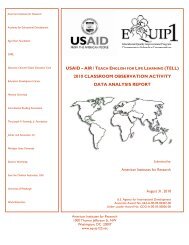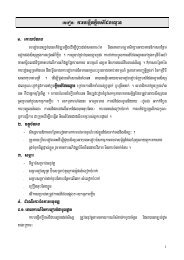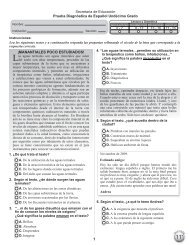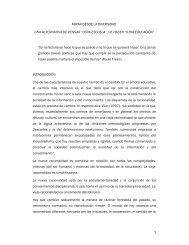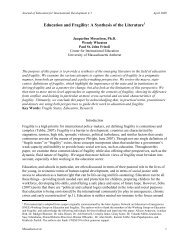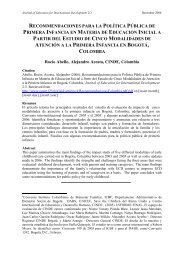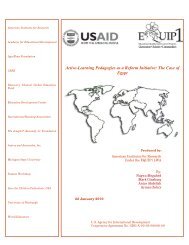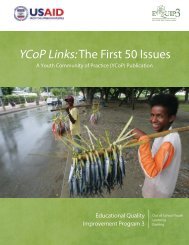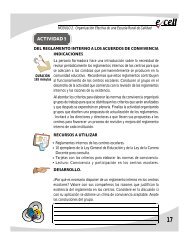The Power of Persistence: Education System ... - EQUIP123.net
The Power of Persistence: Education System ... - EQUIP123.net
The Power of Persistence: Education System ... - EQUIP123.net
You also want an ePaper? Increase the reach of your titles
YUMPU automatically turns print PDFs into web optimized ePapers that Google loves.
eform support during the 1980s and 1990s targeted central government units.<br />
<strong>The</strong> most significant and productive efforts to introduce decentralization began<br />
with the Alexandria Pilot Project (2002-2004) and the <strong>Education</strong> Reform<br />
Program (ERP: 2004-2009), both <strong>of</strong> which targeted those governorates that were<br />
seen to be more conducive to decentralization and other reform initiatives.<br />
Increased community participation in education was supported by the Egyptian<br />
government even before 1981, primarily in the form <strong>of</strong> land donations, financial<br />
support, and volunteer labor (e.g., for school repairs). A 1993 ministerial decree<br />
called for parent and teacher councils to participate in school governance. A 1999<br />
decree promoted an education-related role for NGOs, while also restricting their<br />
‘political’ activities, and a 2002 decree reiterated NGOs’ education role, while also<br />
loosening restrictions on their activities and allowing them to receive funds from<br />
non-Egyptian entities. As was the case with decentralization, the reform-conducive<br />
regions were targeted for pilot work in the Community School Project, New<br />
Schools Project, Alexandria Pilot Project, and the <strong>Education</strong> Reform Program.<br />
Initially, community participation was narrowly defined by stakeholders as<br />
increasing donations and voluntary contributions.<br />
Support for decentralization and community participation was framed in<br />
terms <strong>of</strong> democratization and improving educational quality, particularly in<br />
the context <strong>of</strong> international organization-funded projects. By the early and<br />
mid-2000s, successful implementation <strong>of</strong> decentralization and community<br />
participation processes reinforced the use <strong>of</strong> these approaches in the design<br />
and implementation <strong>of</strong> new projects.<br />
Strategies<br />
From the late 1990s and early 2000s, a number <strong>of</strong> approaches implemented by<br />
USAID and UNICEF projects, among others, received explicit support from<br />
the GOE and put decentralization and community participation into practice.<br />
Among these were the community school and new school programs, girls’<br />
education, boards <strong>of</strong> trustees, and other forms <strong>of</strong> school based management<br />
and community participation.<br />
During the period under review (1981-2007), Egypt experienced sporadic<br />
movement toward increased decentralization, moving from calls for<br />
deconcentration <strong>of</strong> responsibility in the early 1980s to restrictions on local<br />
decision-making authority in the 1990s, and back toward delegation and<br />
devolution after 2001. <strong>The</strong> MOE first delegated responsibilities for education<br />
reform to the governor <strong>of</strong> Alexandria in 2001, supported by the USAID-funded<br />
Alexandria Pilot Project. In 2003, similar delegation <strong>of</strong> responsibilities followed<br />
50<br />
SECTION 2: lESSONS fROM COUNTRY CASE STUdIES



